|
Books Should Be Free Loyal Books Free Public Domain Audiobooks & eBook Downloads |
|
|
Books Should Be Free Loyal Books Free Public Domain Audiobooks & eBook Downloads |
|
Religion |
|---|
|
Book type:
Sort by:
View by:
|
By: Henrietta Vaders | |
|---|---|
 Wikkey A Scrap
Wikkey A Scrap
| |
By: Henry Charles Lea (1825-1909) | |
|---|---|
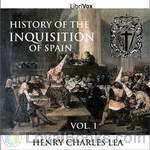 History of the Inquisition of Spain
History of the Inquisition of Spain
The first volume of Lea’s monumental work on the Inquisition of Spain, covering its origin and establishment and its relations with the state. Also included are appendices listing Tribunals, Inquisitors-General, and Spanish coinage. | |
 History of the Inquisition of Spain, Vol. 4
History of the Inquisition of Spain, Vol. 4
The fourth and final volume of Lea's monumental work on the Spanish Inquisition. This volume discusses how the Inquisition dealt with mysticism, solicitation of illicit relationships, bigamy, theological propositions, witchcraft and sorcery, political activity, and almost every other facet of daily life. It concludes with an overarching history of the Inquisition and retrospective. | |
 History of the Inquisition of Spain, Vol. 3
History of the Inquisition of Spain, Vol. 3
The 3rd volume of Lea's monumental work on the Spanish Inquisition. This volume covers torture practices; the trial process; punishments; Jews, Moriscos, and Protestants; and censorship. - Summary by Sienna | |
By: Henry Drummond | |
|---|---|
 The Greatest Thing in the World and Other Addresses
The Greatest Thing in the World and Other Addresses
The spiritual classic The Greatest Thing In the World is a trenchant and tender analysis of Christian love as set forth in the thirteenth chapter of I Corinthians. The other addresses speak to other aspects of Christian life and thought. | |
 Natural Law in the Spiritual World
Natural Law in the Spiritual World
| |
 Beautiful Thoughts
Beautiful Thoughts
| |
By: Henry Edward Manning (1808-1892) | |
|---|---|
 The Love of Jesus to Penitents
The Love of Jesus to Penitents
Henry Edward Manning (1808-1892) was an Oxford-educated Anglican clergyman who converted to Roman Catholicism after the Privy Council ordered the Church of England in 1850 to reinstate an heretical vicar. Manning was ordained a priest in the Roman Catholic Church in 1851, appointed archbishop of Westminster in 1865, and made a cardinal in 1875 by Pope Pius IX.In The Love of Jesus to Penitents, Manning enumerates the many benefits that the Sacrament of Penance affords the penitent: it reveals to the... | |
By: Henry F. (Henry Frey) Lutz | |
|---|---|
 To Infidelity and Back
To Infidelity and Back
| |
By: Henry Frederick Cope (1870-1923) | |
|---|---|
 Religious Education in the Family
Religious Education in the Family
| |
By: Henry Harland (1861-1905) | |
|---|---|
 The Lady Paramount
The Lady Paramount
| |
By: Henry Melvill Gwatkin (1844-1916) | |
|---|---|
 The Arian Controversy
The Arian Controversy
| |
By: Henry Pepwell (-1540) | |
|---|---|
 The Cell of Self-Knowledge : seven early English mystical treatises printed by Henry Pepwell in 1521
The Cell of Self-Knowledge : seven early English mystical treatises printed by Henry Pepwell in 1521
| |
By: Henry Peter Brougham Brougham and Vaux (1778-1868) | |
|---|---|
 The Fallen Star, or, the History of a False Religion
The Fallen Star, or, the History of a False Religion
| |
By: Henry Rider Haggard (1856-1925) | |
|---|---|
 Pearl Maiden
Pearl Maiden
This is the story of Miriam, an orphan Christian woman living in Rome in the first century. She falls in love with a Roman officer, but knows that her Jewish childhood playmate loves her too and will do anything in order to get her love in return. | |
By: Henry Rogers (1806-1877) | |
|---|---|
 The Eclipse of Faith Or, A Visit To A Religious Sceptic
The Eclipse of Faith Or, A Visit To A Religious Sceptic
| |
By: Henry Scougal (1650-1678) | |
|---|---|
 The Life of God in the Soul of Man
The Life of God in the Soul of Man
Henry Scougal was born in Scotland in 1650. The son of the Bishop of Aberdeen, he flourished under rigorous teaching to become Professor of Philosophy at King's College, Aberdeen. In 1672, Scougal was ordained minister in Auchterless and, after a year, returned to King's College as Professor of Divinity. He continued in this office until his death in 1678.The Life of God in the Soul of Man is, in reality, a letter of doctrine and encouragement to a friend wavering in the faith, and was never intended for publication... | |
 Life of God in the Soul of Man (Version 2)
Life of God in the Soul of Man (Version 2)
“In many ways we are still living in the spiritual momentum that was created during the Great Awakening…and in the midst of the Great Awakening there was one man that was most singularly used by God…that man was the great evangelist, George Whitefield.” Published in 1677, The Life of God in the Soul of Man was originally penned in 1676 as a private letter to a friend by 26 year-old Henry Scougal, professor of divinity at King’s College, University of Aberdeen. Less than a century later,... | |
By: Henry Sloane Coffin (1877-1954) | |
|---|---|
 Some Christian Convictions A Practical Restatement in Terms of Present-Day Thinking
Some Christian Convictions A Practical Restatement in Terms of Present-Day Thinking
| |
By: Henry Steel Olcott (1832-1907) | |
|---|---|
 The Life of Buddha and Its Lessons
The Life of Buddha and Its Lessons
| |
By: Henry T. (Henry Thorne) Sell | |
|---|---|
 Studies in the Life of the Christian
Studies in the Life of the Christian
| |
By: Henry Thayer Niles (1825-1901) | |
|---|---|
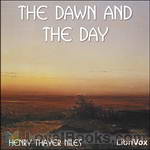 The Dawn and the Day
The Dawn and the Day
The Dawn and the Day, or, The Buddha and the Christ, Part 1 is a text similar to the epic poetry of Homer or, more accurately, classic Hindu texts, such as the Baghavad-Gita. | |
By: Henry van Dyke (1852-1933) | |
|---|---|
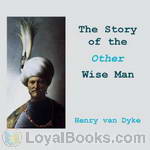 The Story of the Other Wise Man
The Story of the Other Wise Man
You know the story of the Three Wise Men of the East, and how they travelled from far away to offer their gifts at the manger-cradle in Bethlehem. But have you ever heard the story of the Other Wise Man, who also saw the star in its rising, and set out to follow it, yet did not arrive with his brethren in the presence of the young child Jesus? Of the great desire of this fourth pilgrim, and how it was denied, yet accomplished in the denial; of his many wanderings and the probations of his soul;... | |
By: Henry Van Dyke (1852-1933) | |
|---|---|
 The Mansion
The Mansion
| |
 The Story of the Other Wise Man
The Story of the Other Wise Man
| |
By: Henry Ware (1794-1843) | |
|---|---|
 Hints on Extemporaneous Preaching
Hints on Extemporaneous Preaching
| |
By: Henryk Sienkiewicz (1846-1916) | |
|---|---|
 Quo Vadis: a narrative of the time of Nero
Quo Vadis: a narrative of the time of Nero
| |
By: Herbert Allen Giles (1845-1935) | |
|---|---|
 Religions of Ancient China
Religions of Ancient China
An overview of the religions of China, beginning with Fu Hsi, B.C. 2953-2838, and continuing through the 19th Century. | |
By: Herbert J. Hall (1870-1923) | |
|---|---|
 The Untroubled Mind
The Untroubled Mind
A very wise physician has said that “every illness has two parts—what it is, and what the patient thinks about it.” What the patient thinks about it is often more important and more troublesome than the real disease. What the patient thinks of life, what life means to him is also of great importance and may be the bar that shuts out all real health and happiness. The following pages are devoted to certain ideals of life which I would like to give to my patients, the long-time patients who have especially fallen to my lot. | |
By: Hermann Gunkel | |
|---|---|
 The Legends of Genesis
The Legends of Genesis
The Legends of Genesis is the English translation of the introduction to Gunkel’s massive commentary, Genesis. Gunkel uses form critical analysis on the text of Genesis to determine the various genres of the biblical legends and their significance to the authors. Gunkel also uses form criticism to uncover buried clues as to the constituent sources of the text. Gunkel offers his hypothesis to explain how the various sources came to be combined and redacted, and how the text later came to be attributed to Moses. | |
By: Hermann Witsius (1636-1708) | |
|---|---|
 Conciliatory or Irenical Animadversions on the Controversies Agitated in Britain under the Unhappy Names of Antinomians and Neonomians
Conciliatory or Irenical Animadversions on the Controversies Agitated in Britain under the Unhappy Names of Antinomians and Neonomians
The Antinomian-Neonomian controversy of the 17th century was initiated by the republication of a set of sermons by Tobias Crisp entitled "Christ alone exalted" which were accused of antinomianism by Richard Baxter who in turn was accused of 'neonomianism', "the idea that Christ has, by his atonement, so lowered the requirements of the law that mere endeavor is accepted in room of perfect obedience." "The name antinomianism is a comparatively modern designation of several types of ethical thought in which hostility to the Mosaic law and to the principles therein embodied has led to immoral teaching and practise... | |
By: Hermas | |
|---|---|
 Shepherd of Hermas
Shepherd of Hermas
The Shepherd of Hermas is a Christian work likely from the late first half of the second century. It was considered inspired scripture by some of the early Church fathers such as Irenaeus and Origen, but not Tertullian. The Shepherd was very popular amongst Christians in the 2nd and 3rd centuries, and is found in some Bibles after the Acts of the Apostles. The book is made up of five allegorical visions granted to Hermas, a former slave. This is followed by twelve mandates or commandments, and ten similitudes, or parables. | |
By: Hesba Stretton (1832-1911) | |
|---|---|
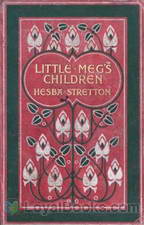 Little Meg's Children
Little Meg's Children
This is the touching and endearing story of Little Meg and her trials and difficulties as she does her best to look after 'her children' after their mother dies. Father is away at sea and is expected every day, but when father's ship comes in he is not aboard! With the help of her new friend and neighbour Kitty, she finds out that he was 'took bad' on the other side of the world, who knows when or if he will ever make it back. Meanwhile, Little Meg must take care of Robby and baby. There are better days and worse days... | |
 Cobwebs and Cables
Cobwebs and Cables
| |
 Jessica's First Prayer and Jessica's Mother
Jessica's First Prayer and Jessica's Mother
Jessica is a little girl who used to be an actress till she grew too big. Now she lives on the streets, mostly starving until she meets Mr. Dan'el. Mr. Dan'el gives Jessica his cast-off crusts and warmed-over coffee. Jessica follows Mr. Dan'el to a building where a bunch of people sing and then listen to a man tell them about someone named God. Jessica wants to know who God is so she sneaks into listen every Sunday, hoping she won't be found out. | |
By: Hester Travers Smith (1868-1949) | |
|---|---|
 Oscar Wilde from Purgatory
Oscar Wilde from Purgatory
Hester Dowden, who wrote under the name Hester Travers Smith, was an Irish spiritualist medium. She claimed to have communicated with the spirits of various celebrities. In Oscar Wilde from Purgatory, she reproduces the text of her "conversations" with the Irish poet and playwright, conducted via a Ouija board and automatic writing. Wilde proves just as talkative after death as he was in life. His spirit revels in the complements paid to his work by Travers Smith and her colleagues, describes how it feels to exist without a body, and pronounces James Joyce's recently published novel Ulysses a "great bulk of filth"... | |
By: Hezekiah Butterworth (1839-1905) | |
|---|---|
 The Story of the Hymns and Tunes
The Story of the Hymns and Tunes
| |
By: Hilaire Belloc (1870-1953) | |
|---|---|
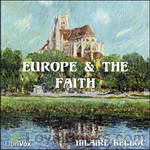 Europe and the Faith
Europe and the Faith
The Catholic brings to history (when I say "history" in these pages I mean the history of Christendom) self-knowledge. As a man in the confessional accuses himself of what he knows to be true and what other people cannot judge, so a Catholic, talking of the united European civilization, when he blames it, blames it for motives and for acts which are his own. He himself could have done those things in person. He is not relatively right in his blame, he is absolutely right. As a man can testify to his own motive so can the Catholic testify to unjust, irrelevant, or ignorant conceptions of the European story; for he knows why and how it proceeded... | |
By: Hippolyte Dreyfus-Barney (1873-1928) | |
|---|---|
 The Universal Religion: Bahaism - Its Rise and Social Import
The Universal Religion: Bahaism - Its Rise and Social Import
“Bahaism is not a new religion,” writes Hippolyte Dreyfus-Barney, “It is religion renewed… it does not pretend to represent the whole Truth; on the contrary, it recognises Truth in fundamental principles which are the basis of all former dispensations, and which for that very reason form the standpoint of concord too long lost sight of. And it requires people to renounce ancient superstitions, to abandon the dead letter in order to be penetrated by the living and vivifying spirit, then by... | |
By: Hippolytus of Rome (170-235) | |
|---|---|
 Treatise on Christ and Antichrist
Treatise on Christ and Antichrist
In this late second century treatise, Hippolytus gives an excellent summary of Early Christian thinking on the subject of the antichrist. Familiar texts from Daniel and Revelation are treated together with his own current events to give a unique perspective. (Summary by Jonathan Lange) | |
By: Horatius Bonar (1808-1889) | |
|---|---|
 Everlasting Righteousness
Everlasting Righteousness
... or How Shall Man Be Just with God?How does salvation work? How does a righteous God declare an unrighteous person to be righteous in His sight? In this comprehensive and devotional study of justification by faith alone in the Person and work of the Lord Jesus Christ, Horatius Bonar answers these questions in a clear and wonderful way. Bonar has been called the prince of Scottish hymn writers. Quoting one of the 600 hymns he wrote, here is "righteous peace securely made" Additional proof-listening by Kimberly Krause. | |
 God's Way of Peace: A Book for the Anxious
God's Way of Peace: A Book for the Anxious
Both a work of theology and psychology, Calvinist revivalist Horatius Bonar guides readers from the universal human need for repentance and faith to the "peace that passes all understanding" that comes from communion with Christ. - Summary by Loren Eaton | |
 Night of Weeping
Night of Weeping
It is no easy matter to write a book for the family of God. Yet it is for them that these thoughts on chastisement are written. They may be found not unsuitable for the younger brethren of the man of sorrows. For the way is rough, and the desert-blast is keen. Who of them can say aught regarding their prospects here, save that tribulation awaiteth them in every place as they pass along. This they must know and prepare for, grasping more firmly at every step the gracious hand that is leading them... | |
 Morning of Joy
Morning of Joy
I have been asked, once and again, to follow up "The Night of Weeping " with "The Morning of Joy," the words of David, in the 30th Psalm, having suggested the addition. After much thought and some hesitation I have done so. The former work was meant to be complete in itself, presenting not merely the night-side of tribulation, but bringing out also, though less prominently, some of its day-hues. As, however, it has been thought incomplete, having in it so much more of night than of clay; an endeavour has been made to complete it by drawing forward the eye to the scenes of morning, so soon to open upon us, in all their breadth and beauty... | |
By: Hosea Ballou (1771-1852) | |
|---|---|
 A Series of Letters in Defence of Divine Revelation
A Series of Letters in Defence of Divine Revelation
| |
By: Howard D. Pollyen | |
|---|---|
 The Secret of the Creation
The Secret of the Creation
| |
By: Howard J. (Howard James) Chidley (1878-1966) | |
|---|---|
 Fifty-Two Story Talks to Boys and Girls
Fifty-Two Story Talks to Boys and Girls
| |
By: Hugh Binning (1627-1653) | |
|---|---|
 The Works of the Rev. Hugh Binning
The Works of the Rev. Hugh Binning
| |
By: Hugh Black (1868-1953) | |
|---|---|
 Friendship
Friendship
The idea, so common in the ancient writers, is not all a poetic conceit, that the soul of a man is only a fragment of a larger whole, and goes out in search of other souls in which it will find its true completion. We walk among worlds unrealized, until we have learned the secret of love. We know this, and in our sincerest moments admit this, even though we are seeking to fill up our lives with other ambitions and other hopes. In spite of the vulgar materialism of our day, we do feel that the spiritual side of life is the most important, and brings the only true joy... | |
By: Hugh Latimer (1485?-1555) | |
|---|---|
 Sermons on the Card
Sermons on the Card
| |
By: Hugh Miller (1802-1856) | |
|---|---|
 The Testimony of the Rocks or, Geology in Its Bearings on the Two Theologies, Natural and Revealed
The Testimony of the Rocks or, Geology in Its Bearings on the Two Theologies, Natural and Revealed
| |
By: Hugh Robert Watkin (1868-1937) | |
|---|---|
 Short Description of Torre Abbey
Short Description of Torre Abbey
Following the Dissolution of the Monasteries in the time of Henry VIII, a significant part of the buildings of Torre Abbey, particularly the church area, lay in ruins. Then, during the 17th century and subsequently, surviving parts of the abbey were incorporated into the creation of a grand private residence, the owner of which in the early part of the 20th century was Colonel Lucius Cary. With the permission of the colonel, Hugh Watkin, who at that time was living in the Chelston district of Torquay, fairly close to the abbey, undertook certain excavations of the remaining ruins between the years of 1906 and 1911... | |
By: Hugh Walpole (1884-1941) | |
|---|---|
 Cathedral
Cathedral
Sir Hugh Seymour Walpole, CBE (1884 – 1941) was an English novelist. He was the son of an Anglican clergyman, intended for a career in the church but drawn instead to writing. Among those who encouraged him were the authors Henry James and Arnold Bennett. His skill at scene-setting, vivid plots, and high profile as a lecturer brought him a large readership in the United Kingdom and North America. He was a best-selling author in the 1920s and 1930s, but has been largely neglected since his death... | |
By: Hyakuzō Kurata (1891-1943) | |
|---|---|
 Priest and His Disciples (Shaw Translation)
Priest and His Disciples (Shaw Translation)
At the age of twenty-six (at the height of the Great War in Europe), the religious pilgrim and maverick Kurata Hyakuzō wrote a profoundly philosophical play called "The Priest & His Disciples" ("Shukke to sono deshi"). This stage play is based on the life and teachings of the 13th century Buddhist priest Shinran (1173-1263) and quickly became immensely popular. Shinran, the historical founder of the True Pure Land School of Buddhism (Jōdo Shinshū), encounters the poor family of Hino Saemon and his wife Okane, and converses with them about how to live in circumstances of change and turmoil and hardship... | |
By: Ignatius Loyola Donnelly (1831-1901) | |
|---|---|
 Atlantis: The Antediluvian World
Atlantis: The Antediluvian World
"Atlantis: The Antediluvian World is a book published during 1882 by Minnesota populist politician Ignatius L. Donnelly, who was born in Philadelphia, Pennsylvania during 1831. Donnelly considered Plato's account of Atlantis as largely factual and attempted to establish that all known ancient civilizations were descended from this supposed lost land. Many of its theories are the source of many modern-day concepts we have about Atlantis, like the civilization and technology beyond its time, the origins of all present races and civilizations, a civil war between good and evil, etc." | |
By: Irenaeus | |
|---|---|
 Against Heresies
Against Heresies
St. Irenaeus, Bishop of Lyons, describes several schools of Gnosticism which were prevalent among pre-Nicene Christianity. He then refutes these beliefs as heresies by contrasting them with what he describes as catholic, orthodox Christianity. Against Heresies demonstrates that earliest Christianity was a fascinating and diverse plethora of beliefs, debates, and schisms. | |
 Demonstration of the Apostolic Preaching
Demonstration of the Apostolic Preaching
Eusebius in his Ecclesiastical History tells us that in addition to his great work Against Heresies, St Irenaeus wrote A Discourse in Demonstration of the Apostolic Preaching. This work was entirely lost sight of: no one seems ever to have quoted a word of it. But it has quite recently reappeared in an Armenian manuscript together with Books IV and V of the greater work. The Armenian translation proves to be a fairly close rendering of the original Greek… What Irenaeus undertakes in the present... | |
By: Irving Bacheller (1859-1950) | |
|---|---|
 Vergilius A Tale of the Coming of Christ
Vergilius A Tale of the Coming of Christ
| |
By: Isaac Barrow (1630-1677) | |
|---|---|
 Sermons on Evil-Speaking
Sermons on Evil-Speaking
| |
By: Isaac Landman | |
|---|---|
 Stories of the Prophets (Before the Exile)
Stories of the Prophets (Before the Exile)
| |